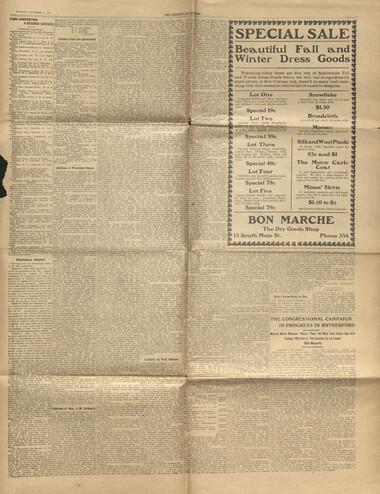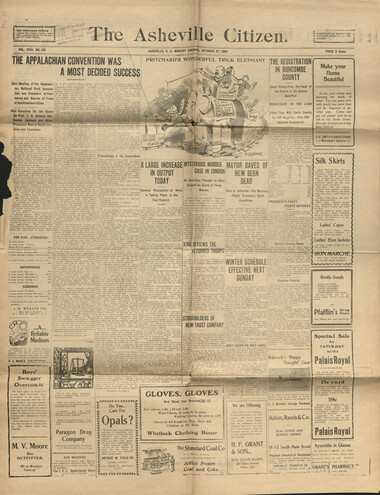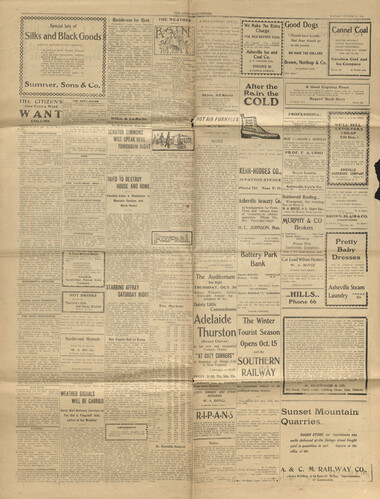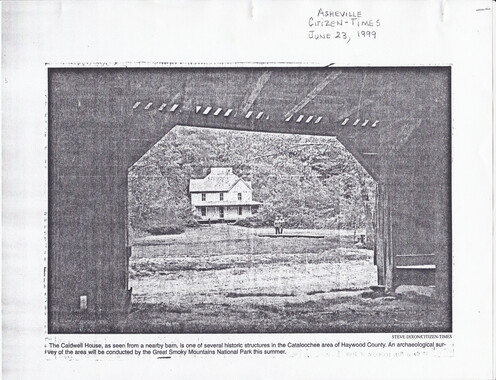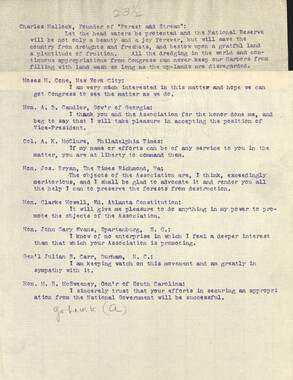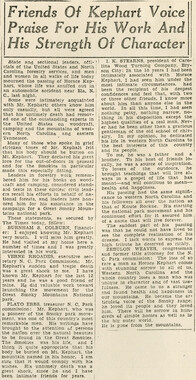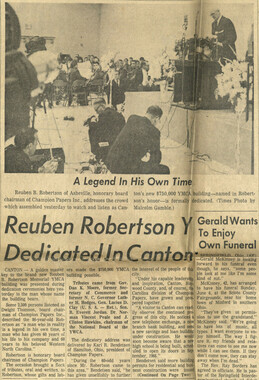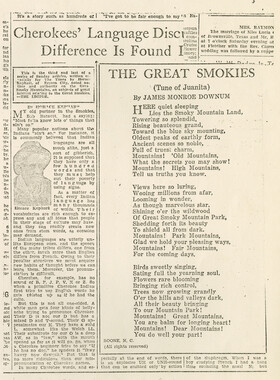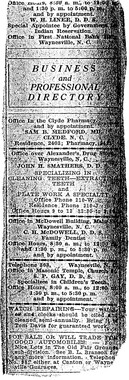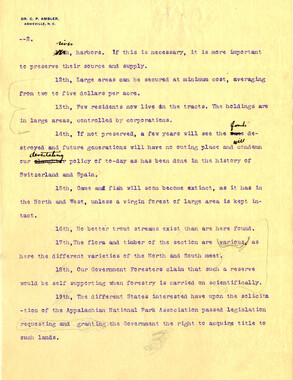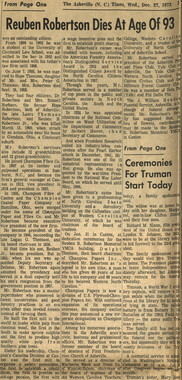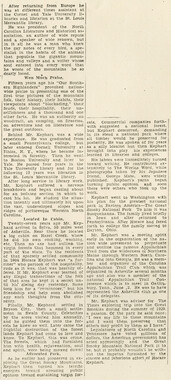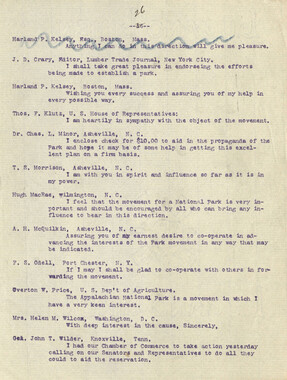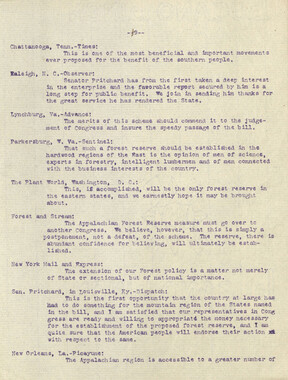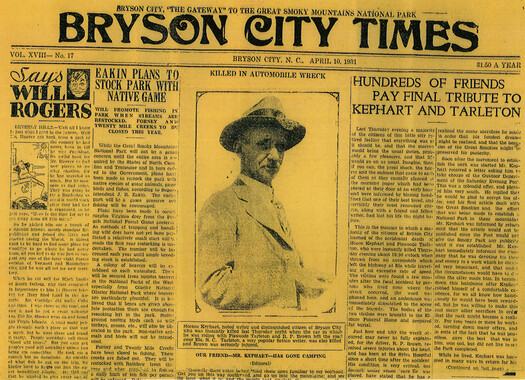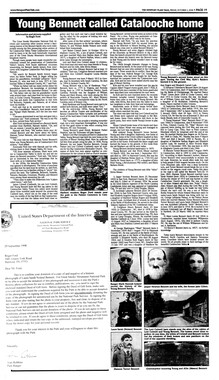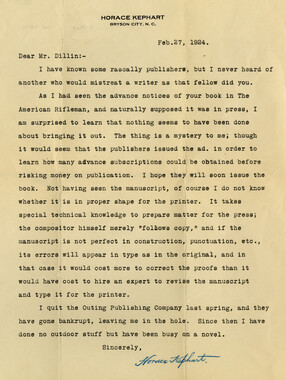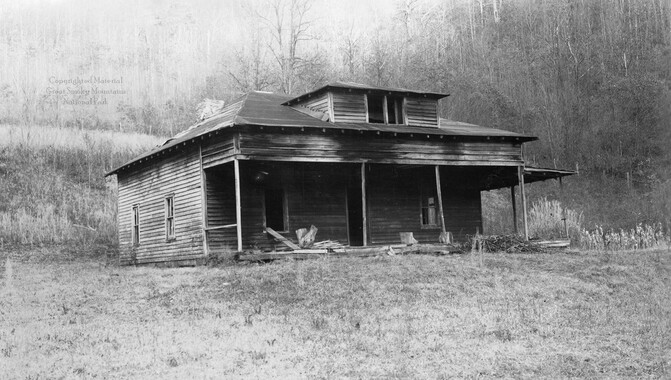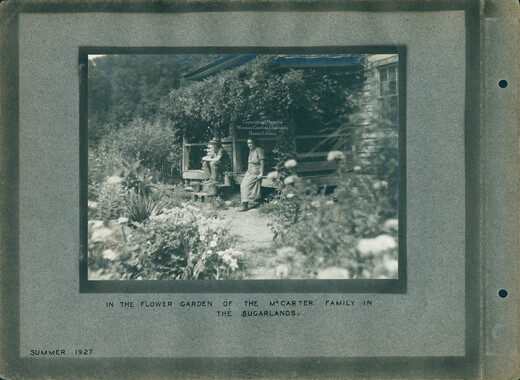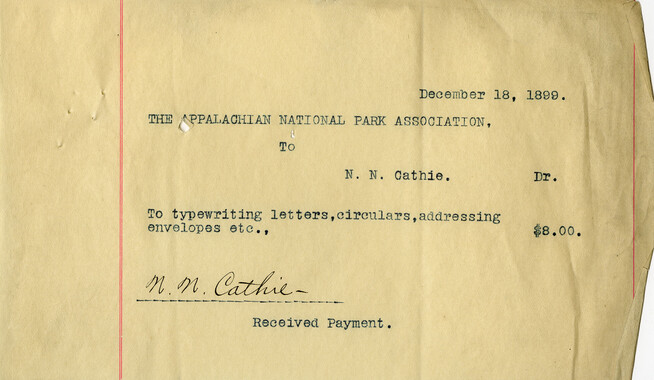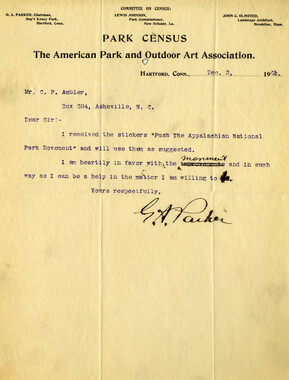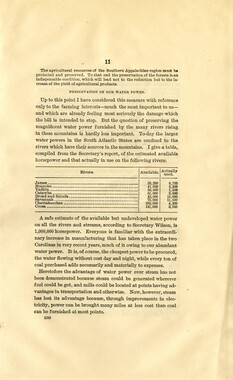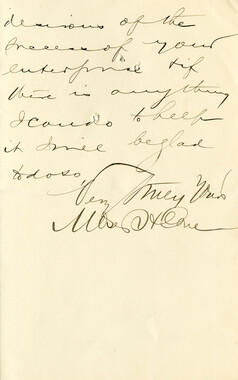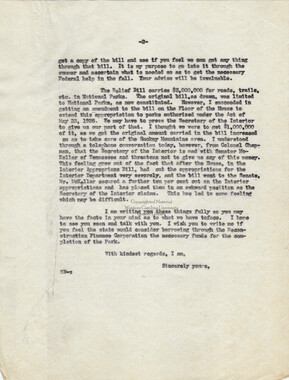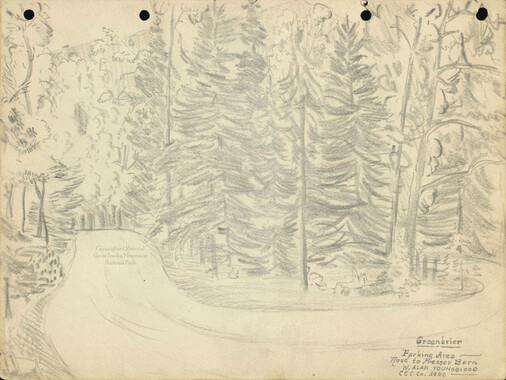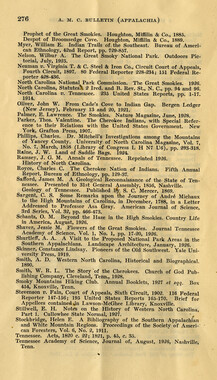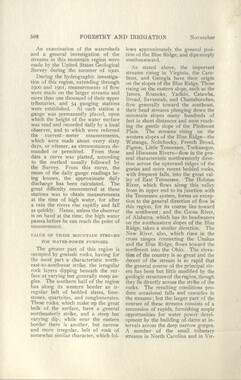Western Carolina University (20)
View all
- Canton Champion Fibre Company (2308)
- Cherokee Traditions (293)
- Civil War in Southern Appalachia (165)
- Craft Revival (1942)
- Great Smoky Mountains - A Park for America (2767)
- Highlights from Western Carolina University (430)
- Horace Kephart (941)
- Journeys Through Jackson (154)
- LGBTQIA+ Archive of Jackson County (26)
- Oral Histories of Western North Carolina (314)
- Picturing Appalachia (6772)
- Stories of Mountain Folk (413)
- Travel Western North Carolina (160)
- Western Carolina University Fine Art Museum Vitreograph Collection (129)
- Western Carolina University Herbarium (92)
- Western Carolina University: Making Memories (708)
- Western Carolina University Publications (2283)
- Western Carolina University Restricted Electronic Theses and Dissertations (146)
- Western North Carolina Regional Maps (71)
- World War II in Southern Appalachia (131)
University of North Carolina Asheville (6)
View all
- Appalachian National Park Association (53)
- Berry, Walter (76)
- Champion Fibre Company (5)
- Fromer, Irving Rhodes, 1913-1994 (70)
- Grant, George Alexander, 1891-1964 (96)
- Kephart, Horace, 1862-1931 (23)
- Masa, George, 1881-1933 (17)
- North Carolina Park Commission (105)
- Roth, Albert, 1890-1974 (142)
- Schenck, Carl Alwin, 1868-1955 (1)
- Stearns, I. K. (2)
- Thompson, James Edward, 1880-1976 (45)
- Weaver, Zebulon, 1872-1948 (55)
- Wilburn, Hiram Coleman, 1880-1967 (72)
- Allanstand Cottage Industries (0)
- Bennett, Kelly, 1890-1974 (0)
- Brasstown Carvers (0)
- Cain, Doreyl Ammons (0)
- Carver, George Washington, 1864?-1943 (0)
- Cathey, Joseph, 1803-1874 (0)
- Champion Paper and Fibre Company (0)
- Cherokee Indian Fair Association (0)
- Cherokee Language Program (0)
- Crittenden, Lorraine (0)
- Crowe, Amanda (0)
- Edmonston, Thomas Benton, 1842-1907 (0)
- Ensley, A. L. (Abraham Lincoln), 1865-1948 (0)
- George Butz (BFS 1907) (0)
- Goodrich, Frances Louisa (0)
- Heard, Marian Gladys (0)
- Kephart, Calvin, 1883-1969 (0)
- Kephart, Laura, 1862-1954 (0)
- Laney, Gideon Thomas, 1889-1976 (0)
- McElhinney, William Julian, 1896-1953 (0)
- Niggli, Josephina, 1910-1983 (0)
- Osborne, Kezia Stradley (0)
- Owens, Samuel Robert, 1918-1995 (0)
- Penland Weavers and Potters (0)
- Rhodes, Judy (0)
- Roberts, Vivienne (0)
- Sherrill's Photography Studio (0)
- Smith, Edward Clark (0)
- Southern Highland Handicraft Guild (0)
- Southern Highlanders, Inc. (0)
- Stalcup, Jesse Bryson (0)
- United States. Indian Arts and Crafts Board (0)
- USFS (0)
- Vance, Zebulon Baird, 1830-1894 (0)
- Western Carolina College (0)
- Western Carolina Teachers College (0)
- Western Carolina University (0)
- Western Carolina University. Mountain Heritage Center (0)
- Whitman, Walt, 1819-1892 (0)
- Williams, Isadora (0)
- 1810s (1)
- 1840s (1)
- 1850s (2)
- 1860s (3)
- 1870s (4)
- 1880s (7)
- 1890s (64)
- 1900s (294)
- 1910s (227)
- 1920s (461)
- 1930s (1585)
- 1940s (82)
- 1950s (15)
- 1960s (13)
- 1970s (47)
- 1980s (14)
- 1990s (17)
- 2000s (31)
- 2010s (1)
- 1600s (0)
- 1700s (0)
- 1800s (0)
- 1820s (0)
- 1830s (0)
- 2020s (0)
- Appalachian Region, Southern (80)
- Asheville (N.C.) (1)
- Avery County (N.C.) (6)
- Blount County (Tenn.) (159)
- Buncombe County (N.C.) (204)
- Cherokee County (N.C.) (10)
- Clay County (N.C.) (3)
- Graham County (N.C.) (108)
- Great Smoky Mountains National Park (N.C. and Tenn.) (438)
- Haywood County (N.C.) (263)
- Henderson County (N.C.) (13)
- Jackson County (N.C.) (58)
- Knox County (Tenn.) (21)
- Knoxville (Tenn.) (11)
- Lake Santeetlah (N.C.) (10)
- Macon County (N.C.) (25)
- Madison County (N.C.) (14)
- McDowell County (N.C.) (5)
- Mitchell County (N.C.) (7)
- Polk County (N.C.) (2)
- Qualla Boundary (22)
- Rutherford County (N.C.) (16)
- Swain County (N.C.) (516)
- Transylvania County (N.C.) (36)
- Watauga County (N.C.) (2)
- Waynesville (N.C.) (2)
- Yancey County (N.C.) (34)
- Aerial Views (3)
- Articles (1)
- Artifacts (object Genre) (4)
- Bibliographies (1)
- Clippings (information Artifacts) (77)
- Drawings (visual Works) (174)
- Envelopes (2)
- Financial Records (9)
- Fliers (printed Matter) (34)
- Guidebooks (1)
- Interviews (12)
- Land Surveys (102)
- Letters (correspondence) (219)
- Manuscripts (documents) (91)
- Maps (documents) (86)
- Memorandums (14)
- Minutes (administrative Records) (20)
- Negatives (photographs) (282)
- Newsletters (12)
- Paintings (visual Works) (1)
- Pen And Ink Drawings (1)
- Photographs (1657)
- Portraits (40)
- Postcards (15)
- Publications (documents) (107)
- Scrapbooks (3)
- Sheet Music (1)
- Songs (musical Compositions) (2)
- Sound Recordings (7)
- Speeches (documents) (11)
- Transcripts (46)
- Aerial Photographs (0)
- Albums (books) (0)
- Biography (general Genre) (0)
- Cards (information Artifacts) (0)
- Crafts (art Genres) (0)
- Depictions (visual Works) (0)
- Design Drawings (0)
- Facsimiles (reproductions) (0)
- Fiction (general Genre) (0)
- Glass Plate Negatives (0)
- Internegatives (0)
- Newspapers (0)
- Occupation Currency (0)
- Periodicals (0)
- Personal Narratives (0)
- Plans (maps) (0)
- Poetry (0)
- Programs (documents) (0)
- Questionnaires (0)
- Slides (photographs) (0)
- Specimens (0)
- Text Messages (0)
- Tintypes (photographs) (0)
- Video Recordings (physical Artifacts) (0)
- Vitreographs (0)
- Appalachian National Park Association Records (336)
- Carlos C. Campbell Collection (282)
- Cataloochee History Project (65)
- George Masa Collection (89)
- Hiram C. Wilburn Papers (28)
- Historic Photographs Collection (236)
- Horace Kephart Collection (126)
- Humbard Collection (33)
- Jim Thompson Collection (44)
- Love Family Papers (11)
- Map Collection (12)
- R.A. Romanes Collection (10)
- Smoky Mountains Hiking Club Collection (616)
- Zebulon Weaver Collection (107)
- A.L. Ensley Collection (0)
- Appalachian Industrial School Records (0)
- Axley-Meroney Collection (0)
- Bayard Wootten Photograph Collection (0)
- Bethel Rural Community Organization Collection (0)
- Blumer Collection (0)
- C.W. Slagle Collection (0)
- Canton Area Historical Museum (0)
- Cherokee Studies Collection (0)
- Daisy Dame Photograph Album (0)
- Daniel Boone VI Collection (0)
- Doris Ulmann Photograph Collection (0)
- Elizabeth H. Lasley Collection (0)
- Elizabeth Woolworth Szold Fleharty Collection (0)
- Frank Fry Collection (0)
- Gideon Laney Collection (0)
- Hazel Scarborough Collection (0)
- Hunter and Weaver Families Collection (0)
- I. D. Blumenthal Collection (0)
- Isadora Williams Collection (0)
- Jesse Bryson Stalcup Collection (0)
- John B. Battle Collection (0)
- John C. Campbell Folk School Records (0)
- John Parris Collection (0)
- Judaculla Rock project (0)
- Kelly Bennett Collection (0)
- Major Wiley Parris Civil War Letters (0)
- McFee-Misemer Civil War Letters (0)
- Mountain Heritage Center Collection (0)
- Norburn - Robertson - Thomson Families Collection (0)
- Pauline Hood Collection (0)
- Pre-Guild Collection (0)
- Qualla Arts and Crafts Mutual Collection (0)
- Rosser H. Taylor Collection (0)
- Samuel Robert Owens Collection (0)
- Sara Madison Collection (0)
- Sherrill Studio Photo Collection (0)
- Stories of Mountain Folk - Radio Programs (0)
- The Reporter, Western Carolina University (0)
- Venoy and Elizabeth Reed Collection (0)
- WCU Gender and Sexuality Oral History Project (0)
- WCU Mountain Heritage Center Oral Histories (0)
- WCU Oral History Collection - Mountain People, Mountain Lives (0)
- WCU Students Newspapers Collection (0)
- Western North Carolina Tomorrow Black Oral History Project (0)
- William Williams Stringfield Collection (0)
- Appalachian Trail (22)
- Church buildings (9)
- Civilian Conservation Corps (U.S.) (91)
- Dams (21)
- Floods (1)
- Forest conservation (11)
- Forests and forestry (42)
- Great Smoky Mountains National Park (N.C. and Tenn.) (82)
- Hunting (2)
- Logging (25)
- Maps (74)
- North Carolina -- Maps (5)
- Postcards (15)
- Railroad trains (8)
- Sports (4)
- Storytelling (2)
- Waterfalls -- Great Smoky Mountains (N.C. and Tenn.) (39)
- African Americans (0)
- Artisans (0)
- Cherokee art (0)
- Cherokee artists -- North Carolina (0)
- Cherokee language (0)
- Cherokee pottery (0)
- Cherokee women (0)
- College student newspapers and periodicals (0)
- Dance (0)
- Education (0)
- Folk music (0)
- Forced removal, 1813-1903 (0)
- Gender nonconformity (0)
- Landscape photography (0)
- Mines and mineral resources (0)
- Paper industry (0)
- Pottery (0)
- Rural electrification -- North Carolina, Western (0)
- School integration -- Southern States (0)
- Segregation -- North Carolina, Western (0)
- Slavery (0)
- Weaving -- Appalachian Region, Southern (0)
- Wood-carving -- Appalachian Region, Southern (0)
- World War, 1939-1945 (0)
- Sound (7)
- StillImage (2172)
- Text (655)
- MovingImage (0)
Appalachian convention was a most decided success
Item
Item’s are ‘child’ level descriptions to ‘parent’ objects, (e.g. one page of a whole book).
-
-
H. C. Eccles, Col. Daugh- J. T. Nlght- A. B. Ad- C: J. C. Reo- MONDAY, OCTOBER 27, 1902. PARK CONVENTION A DECIDED SUCCESS Continued from Page 2. From Charlotte, N H. R. Wilcox. From Waynesville, N. C: Col W W Stringfield. From Chapel Hill. N. C: Prof. J. A Holmes (N. C. geological survey), R H Sykes. From Calhoun Falls, S. C: Granville Beale. From Greenville, S. C • erty. From Atlanta, Ga.: W. engale. From Dalton, Ga.: Col. ams. Fom Newman, Ga.: E. T. Whatley From Chicago, 111.: B. F. Culver. From Bowman's Bluff, N. C: j. Holmes. From Henderson county, N. N. Murry, M. L. Shlpman, W tor. From Jackson county, N. C: Col. D. D. Davles. From Gombroon, N. C.: J .H. Martin, Haywood county: Bailey Jones, C. G. Logan. From Tate Springs, Tenn.: Dr. R. S. Tidwell. From Rankin, Tenn.: A. C. Moore. From Newton Highlands, Mass.: Walter Allen. From Del Rio, Tenn.: J. W. D. Stoke- iy. From Cincinnati, O.: F. B. James. List of Boards of Trade and Chambers of Commerce whose letters of endorsement of the proposed park movement were spread before the convention: New York City Board of Trade and Transportation. Johnson City, Tenn., Board of Trade. Danville, Va„ Business Men's Association. Middlesboro, Ky., Board of Trade. Chattanooga, Tenn..Chamber of Commerce. Richmond, Va., Chamber of Commerce. Nashville, Tenn., Chamber of Commerce. Montgomery, Ala., Commercial and Industrial Association. Bristol, Tenn., Board of Trade. Greenville, S. C, Board of Trade. Norfolk, Va., Chamber of Commerce. Meridian, Miss., Board of Trade. Louisville, Ky., Board of Trade. Jacksonville, Fla., Board of Trade. Morristown, Tenn.. Board of Trade. Knoxville, Tenn., Chamber of Commerce. Newport, Tenn. Raleigh, N. t'., merce. Durham, N. C, Chamber of Commerce. Asheville, N. C, Board of Trade. Newman, Ga., Board of Trade. Dalton, Ga., Board of Trade. Jonesboro, Tenn., Board of Trade. charlotte, N. c, Chamber of Commerce. Greenville, Tenn., Board of Trade. NOTES. The students of the Normal and Collegiate Institute attended the evening Session in a body and occupied the center balcony of the Auditorium. It is estimated that between 1200 and 1500 persons were present at the evening session. Saturday morning the courtesies of the Biltmore estate were extended to the visiting delegation. A tally-ho party was made up by tcme of the Knoxville delegation for the Biltmore drive. The Jonesboro (Tenn.) delegation to Biltmore was accompanied by Mayor Miller. Those who went to Biltmore express ed themselves as being highly delighted With their trip. "This outing alone, they declared, •was worth coming to Asheville." The largest delegation was from Knoxville. Knoxville claimed 4") delegates. The majority of the delegates arrived Friday night on train No. 16 from the east, due here at 10 o'clock. They were met at the station by the joint reception committee appointed by the Appalachian Park association and the Board Qf Trade and escorted to the hotels The reception committee Saturday ulfo met all the Biltmore trains. Most of the delegates remained over in Asheville until yesterday, leaving on the afternoon trains. THE ASIIEVILl^CimRN tablishment of the National Appalacn- j result of the same American enterprise ian Forest Reserve as the only possible [that threatens the extinction of our Ap- means of overcoming these existing and Increasing evils. W. B. LOCKETT, "It. P. HAYES, "H. C. ECCLES. "Committee." Board of Trade. Chamber of Com- Letters from the Governors Letters of endorsement from governors spread before the convention, from the following states: North Carolina, West Virginia, Virginia, Louisiana, Florida, Kentucky, Georgia. OFFICERS OF THE ASSOCIATION. President, Rutherford P. Hayes. Secretary and Treasurer, Dr. C. <J. Ambler. VICE PRESIDENTS: North Carolina—Col. A. B. Andrews, Gen. Julian S. Carr, S. Wittkowsky, T. W. Patton. G. W. Pack, Prof. J. A. Holmes. Georgia—Hon. A. D. Candler, governor; Hon. Clark Howell. Virginia—Governor Montague. Massachusetts—Dr. Henry O. Marcy, Albion A. Perry. South Carolina—Hon. John Gary Evans, Hon. M. B. McSweeney, Dr. Francis L. Parker. Tennessee—Dr. Charles Dabney, Gen. John T. Wilder, R. W. Austin, B. R. Strong, Hon. A. A. Taylor. Ohio—Hon. Wm. R. Day. Hon. Jas. R. Garfield. Illinois—A. C. Bartlett. Pennsylvania—Miss E. O. Abbott, Chas. C. Harrison. New York—Moses H. Cone. District of Columbia—Wm. R. Smith. DIRECTORS: North Carolina—H. T. Collins, T. W. Patton, H. T. Rogers, Claybrook James, W. B. Northup, J. A. Nichols, Chas. McNarnee, C. A. Webb. South Carolina—J. C. Garlington. District of Columbia—M. V. Richards. Rhode Island—R. S. Howland. Kentucky—T. C. Mason. COMMITTEE ON MEMBERSHIP: Wm. Johnson, jr., chairman; M. D.! Long, H. C. Eccles, F. E. Mitchell, C. A. Webb, H. A. Miller, F. S. Odell, New- York; J. C. Garlington. COMMITTEE WAYS AND MEAN'S: J. A. Nichols chairman, H. C, Eccles, Charlotte, N. C; Moses H. Cone, New York; T. W. Raoul, J. F. Hayes, G. H. Smathers, E. B. Atkinson. Dr. Thomas Law rencc, W. W. Rollins, James H. Cutler, Massachusetts. COMMITTEE ON PETITIONS AND MEMORIALS: Chas. McNamee, chairman, J. F. Hayes, N. G. Gonzales, Pleasant A. Stovall, Georgia; Geo. H. Smathers. COMMITTEE OX PUBLICITY AND PROMOTION: Dr. C. P. Ambler chairman, J. E. Norton, F. L. Merritt, 11. T. Collins, F. W. w. Graham. Address ot President Hayes President Hayes in opening the convention made a short address. He said: "It is with great pleasure that I call this convention to order and in the name of the various organizations connected with the preparations for this meeting to hid you welcome. "To us living here in the mountains the great Importance of the Appalachian Forest Reserve is well known, but others may not understand the need of it so well. "I will give a summary of the reasons given by the President of the United palachian hard wood forests. These far 'ustcrn parks are inaccessible to the people of the east and south, while to all the benefits and pleasures that they east is as much entitled as the west, ir is a maxim of the law that equality is equity. "If heretofore the government has not had the opportunity to secure such a reservation east of the Mississippi river, it has it now. But there are other t qulties. The country owes a great debt to our southern ancestors. The west is indebted for its prosperity and greatness, in large measure, to the fostering care of the federal government. The South has been (he builder of Its own fortunes. It is true that we share in the rivers and harbors appropriations of congress, either equitably or in proportion to the influence of our representatives. Our harbors have been improved and some of our inland rivers have been deepened, though at times it would seem that appropriations have been scattered along the streams with a judicious regard for the prevention of results. But these appropriations, however applied, are virtually all the direct aid that we receive from the general government. "If we look back a hundred years we shall see the beginnings of the northwest, and always we shall find the army marching in front of the settlers. Here our fathers came first. No St. Clair met defeat, and no Wayne triumphed over the savages to clear the way for the white men in these moun tains. Our sturdy fat'hers were their own army, always, and their own government when necessary. They alone and unaided gave this southwest to the white race, to liberty and to civilization. This whole Appalachian region was wrested from the Indians by the valor and prowess of the man from \Vhom we are descended, who singly or in little bands first crossed its mountains, peopled its valleys, fought their own battles and made no step backward. They were always ahead of the government, seldom aided by its army, and often, 1 am compelled to admit, independent of its treaties. The conquest was theirs alone. The Western Carolinas, the Western Virginias, Tennessee and Kentucky, were in very truth gifts of the pioneers to the Republic. "In the northwest the gift of the states to the republic or its purchased property, a benign and fostering government—a wise government—not only gave the settlers their homes and guarded them with its armies, but, with a wisdom beyond praise, set apart lands for the purpose of schools. We had no school lands, or almost none. In Tennessee we got 22,000 acres, when we should have had over 400,000 acres. The government had it to give, but we appealed for it in vain. I do not complain nor say that we were free from fault; I only state the fact. Later, when the west needed railroads, the federal government not only gave the railroad corporations vast areas of land, but more than once loaned them Its credit, and results have justified both the expediency and the merit of the policy. The northwest was built upon a lattice of subsidized railroads. Our railroads were built as our lands were won, without federal aid. Along the line of railroad that traverses the entire length of the valley of East Tennessee.there was hardly a land owner, large or small, who did not aid in the work of its construction. For forty years my native state has been the slave of a pected to have most fortunate results. "In his message transmitting Secie- obviously necessary and may be ex- tarv Wilson's report to congress, President Roosevelt said: 'With these conclusions I fully agree, and I heartily lommend this measure to the favorame consideration of congress.' "What is this Southern Appalachian region, this 'chief physiographic 'ea-}]XTe nf *\,~ A.,B.A^n katf ^e the enntinent . It States iii his message to Congress on debt that was incurred in aiding the Resolutions Adopted Following are the resolutions adopted by the convention: "Resolved, That this convention records its appreciation of the support rendered by the Boards of Trade, Chambers of Commerce and other organizations in different parts of this country in urging the protection of the forests of the Southern Appalachian mountains; and it asks the further active co-opeation of these, as well as other organizations, in securing the prompt passage by Congress of the bil now before the House of Representatives providing for the establishment of the Na- tLniil Appalachian Forest Reserve. "Resolved, That the chairman of this -ntion appoint a committee of seven, including the president and secretary of the Appalachian association, the people of this country full informa- the people of this countr yfull information as to the purposes of the Appalachian Forest Reserve bill now pending in Congress, and -shall take such further action as it may deem best to secure the passage of this bill by Congress during its approaching short session. "Resolved. That this convention heartily approves the action of Congress in establishing the great national forest reserves in the western states and territories, and the more recent action of Congress, in providing for the construction of a great system of irrigation works in these states; and inasmuch as the forests and the soils which these forests protect in the Southern Appalachian mountain region serve as a. natural reservoir for the storage of the water which falls in excessive rains i i this region, this convention asks the i o-oporation-of the senators and representatives in Congress from the western Mates in securing the passage of the Appalachian forest reserve bill now fcefore Congress as an extension to these southeastern states of the great poller of natural water storage by the government which has already wisely been inaugurated In the west. "In view of the Importance of the establishment of the proposed Appalachian Forest Reserve, in connection with the perpetuation of the supply of hardwood timber in this country and as a means of demonstrating by the government what can be done through the application of sound methods in the management of such forests this convention expresses Its appreciation of the aid which practical lumbermen have extended In promoting this measure, and it respectfully asks the officers and members of the great lumber associations of this country to further co-operate actively in securing the favorable and prompt action in Congress on the ■leaeure now before it. -Resolved, That the thanks of this convention are hereby extended to the general technical press of the country for its active and unanimous support, or the movement looking to the preservation of the forests of the Southern Appalachian region, and this convention asks the further co-operation and assistance of the press in seeunng the prompt passage by the House of Representatives of the bill now before that foody providing for the establishment of the Appalachian National Forest Re- **The Honorable; the Speaker of the House of Representatives: "in consideration of the fact oi Hie rapid and steadily increasing ■ .1, m F/M'a«t« on tl-_ mountains are this subject why the reserve should be established. "The Southern Appalachian region embraces the highest peaks and largest mountain masses east of the Rockies. it la the great physiographic feature of the eastern half of the continent, and no such lofty mountains are covered with hard wood forests in all North America. "Upon these mountains descend the heaviest rainfall of the United States, except that of the North Pacific coast. It is often of extreme violence, as much as eight inches having fallen in eleven hours, thirty-one inches in one month, and one hundred and five inches In one year. "The soil, once denuded of its forests and swept by torrential rains, rapidly loses first its humus, then its rich upper strata, and finally Is washed in enormous volume into the streams to bury such of the fertile lowlands as are not I by thf floods, to obstruct the rivers, and to fill up the harbors on the coast. More good soil is now washed from these cleared mountain side fields during a single heavy rain than during centuries under forest cover. "The rivers which originate in the Southern Appalachians flow into, or along, the borders of every state from Ohio to the Gulf and from the Atlantic to the Mississippi. Along their courses are agricultural, water power and navigation interests whose preservation Is absolutely essential to the well being of the nation. The regulation of the flow of these rivers can be accomplished only by the conservation of the forests. "These are the heaviest and most beautiful hardwood forests of the continent. In them species from the east to went, from north and south, mingle in n growth of unparalleled richness and variety. They contain many spe- r the first commercial value and furnish important supplies which cannot be obtained from any other region. "For economic reasons the preservations of these forests is imperative. railroads within its borders. Last the list of great public benefactions to :hc west is the provision for the irrigation of its arid lands. Thus wisely, and with the most beneficent results, the republic has mothered the west, lov-. ingly and liberally mothered it: and now has every reason to be proud of its work. To us she has been a just moth- ol without affection, though unpleasantly intolerant of a certain truancy of ours. "The east, being strong, has not needed help, but its ship lines have been aided, and conceding that the policy of the government for the last half century has been good for all, it certainly has been best for the east. "These are some of the many equities thtit support our claim for a national Appalachian reservation. "It. has been suggested that there is ■ nstitutional warrant for the acquisition of private lands for such a public use. This is no place for a constitutional argument, but it would seem that if the use be a public one, and the method of acquisition not an unjust one, the present ownership need not be considered. That it Is a legitimate public use is demonstrable by reason and by precedent. Moreover the American people have come to have great faith in the sound elasticity of the constitution; having witnessed with satisfaction many demonstrations of the latent capacities of that great instrument for wise and good purposes—not dreamed of by our fathers, and exceeding their expectations, for more than this undertaking. The pending bill has been approved by two presidents and has been passed by the Senate. In my opinion it cannot be defeated, except on a wailure of duty on the part of our own people. The North Carolina senators have done their duty nobly; an eloquent senator from New York has given them invaluable aid; the legislatures of most of the states that are directly affected have taken proper action for the granting of necessary rights to the of the eastern half of the continent. is the mountain country of the virgin- las, the Carolinas, Kentucky, Tennessee, Georgia and Alabama. It embraces the lovely regions, fitly called the Land of the Sky' and the 'Sapphire Country.' I may be pardoned for adding that it also includes Kast Tennessee and the city of Knoxville. No man has seen more beautiful things * *in those southern mountains. How well do Ruskin's beautiful words and imagery- fit them: 'Cathedrals of the earth, with their gates of rock, pavements of cloud, choirs of streams and stones, altars 01 snow, and vaults of purple, traversed by the continual stars.' One glory or these mountains is their waters, for 'no clearer or diviner waters ever sang with constant lips of the land which giveth rain from heaven.' Another glory is their forests with their trees 'rooting themselves in inhospitable rocks.crowd- ing down together to drink at sweetest streams, climbing hand In hand among the difficult slopes, gliding in grave procession over the heavenward ridges. "It is the waters and the rivers that we would save, for their" beauty, and for all the benefits which they Destow upon men. One may hesitate to plead for more beauty in an age so ulitarlan, and yet apart from all other considerations, it seems to me a desecration, a crime which cannot be extenuated, to rob these mountains of their glorious woods, to dry up the springs, to convert the streams into dribbling rivulets, save when they are made raging torrents by the rains that fall on the stripped rocks. Those mountains are the homes of the trees, they are not fit for ploughmen. It is folly, as well as a crime, to destroy the trees. The mountains are nature's reservoirs of pure water for the uses of man. They are not to remain untouched, but to be treated wisely, with consideration and with unfailing care. "We do not ask that the woodman shall be excluded from these forests, only that he shall cull in moderation and with judgment. The untold wealth of these ancient woods was meant for man, but to be used, hot abused. A scientific writer says of the forests'. 'Perhaps no other natural agent has done so much for the human race and has been so recklessly used and so little understood.' "We have reached the point in America where vandalism in our forests must be checked. Fortunately we have seen the evils that the ruthless lumberman may do before his invasion of our southern forest has become ir- resistable, but the wanton destruction that he has wrought elsewhere now drives him to us. Of the woods of the Appalachian mountain region perhaps one-fourth have disappeared, the remainder have been saved by prompt action of congress. Let us not charge all the harm that has been done to the strange lumberman. The natives are by no means without fault. Thousands of 'old sedge fields scattered through the South attest the incapacity and the improvidence of our small farmers. They were murdered by perpetual crops of corn. "In the mountains the belief still prevails that the chief end of man and of the earth is to raise corn without ceasing. The heavy feeding corn quickly devours the soil of the little valleys and the farmer begins to clear the hills. The steep slope is laid bare and a bull tongue plough, steer impelled, makes straggling incisions three inches deep among the rocks and stumps. The virgin soil yields fair returns. The fall and winter rains wash away the soil that has been loosened; the next year the bull tongue scratches three inches deeper and in the fall another three inches of soil is washed away. As the soil departs the crops decrease, and in five or six years the soil is all gone and the ploughman must climb higher. At last he reaches the limit of his land or of the steer's capacity to climb, he has killed the trees, his farm has been washed away and he goes west in search of new lands to destroy. Upon the barren waste he has made there is nothing to hold the rains that fall;the water gathers and rushes into the valley, the streams are swollen and floods are upon the lowlands ° V Oresnn T1-^- b>' HSht 0f disCOV- , ,i7„°!tan(1 * "shington), and still I Trhe re,ni?°n, Was ceded b>* Mexico «-^da?nUit .°f war (California, Utah, j >e->ad. and Arizona). Had all these1 forest lands been sold by our govern! rfne nat£r°?eds would have «&«in- t0nd ano,h»nal.,reasUry and in one way eXll* hsv! ,?s: bUt' hlStead' Iar«e .reastaebM withdrawn from sale and set aside as national forest reserves for the general benefit of the na- U.°?nf ,Vvho,e. but for the special ben- e ivh th States and territories within l^v heof 'eserves are located, which th £iv kP by PerPetuating the timber supply by protecting the sources of important streams and by preventing the ultimate destruction of the great western mountains themselves There are 41 of these separate reserves, ranging in area from 10,000 acres to ite million acres: the total area of all of these reserves being more than 72,000 square miles, or a little more than forty-six million acres. These western forest reserves have cost the government scarcely ten million dohars. Besides rendering the people 01 the western states a service which will be of incalculable and perpetual value indirectly, they have already attained a commercial value of not less than $200,000,000. This is clearly proving a good investment for the nation. The establishment of the proposed Appalachian forest reserve involves tne purchase by the government of the forest covered lands which are to be m- Their existence in good condition is es- ! federal government; various organiza- sential to the prosperity of the low lands through which their waters run. Maintained in productive condition ihey will supply Indlspenslble materials, and which must fail without them. Their management under practical and conservative forestry will sustain and Increase the resources of this region and of the nation at large, will serve as an ini Liable object lesson in the advantages and practicability of forest preservation by use, and will soon be self-supporting from the sale of timber. "The agricultural resources of the Southern Appalachian region must be protected and preserved. To that end the preservation of the forests is an Indlspenslble condition, which leads not to the reduction, but to the increase of ihe yield of agricultural products. "The floods of these mountain-botn mis, if this forest destruction con- . will increase in frequency and violence and in the extent of their damages, both within this region and across the bordering States. The extent their damages, like those from the washing of the mountain fields and roads cannot be estimated with perfect accuracy, but during the year of 1901 alone the total approximated ten millions of dollars, a sum sufficient to purchase the entire area recommended for the proposed reserve. But this loss cau tions In the South are supporting the movement earnestly; and the press of the entire country is favorable. To the secretary of agriculture and his learned assistants, the friends of the movement can hardly be sufficiently grateful. Public opinion in the South is favorable, but it has not been adequately expressed, and we must regret occasional declarations of adherence, mainly by private statesmen, to theories of constitutional construction that are wholly untenable. Our fathers devoutly worshipped the letter of the constitution, but to us it has been revealed that behind the strict letter there is a most liberal spirit, and to that alone we pay our more enlightened allegiance. "The fate of the park measure now depends upon the popular branch of congress. There is no need for a pt and positive expression of pub- ntiment. To arouse our people to a more active support is the most im- unt office of this convention, and of to this and a more general knowledge of facts is indispensable. Therefore, with the hope that what is said here may reach some of the people, I venture at the risk of wearying you, to recall attention to certain indisputable and convincing facts. The largest facts, I assume, are well known to this audience, but a brief recapitulation of Secretary not be estimated in money value alone, j Wilson's conclusions may be desirable. Its continuance means the early de-|They are as follows: Structlon of conditions most valuable first—That the Southern Appalachi- [■■ the nation and which neither skin indent ptam nor wealth can restore. . largest mountain masses east of "The preservation of the forests of | the Rockies, and is the chief physio- toe streams and of the agricultural in-j graphic feature of the eastern half of terests here described can be successfully accomplished only by the purchase and creation of it National Forest Reserve. "The states of the Southern Appalaeh ian region own little or no land, and the continent "Second—That upon them the rainfall is heavier than upon any other part of the United States, except the North Pacific coast. 'Third—That more good soil is now .heir revenues are inadequate to carry; washed from the clear fields on the out this plan. Federal action is obvious-; slopes of these mountains by a single ly necessary, is fully justified by rea- ! heavy rain than during centuries under son of public necessity, and may be ex- j forest cover. pected to have most fortunate results." i "Fourth—That rivers originate in —'— j this region that touch every state from Arlrirocc nf Unn I W HalrlM/pll' o;'io to tne Gulf'and from bhe Atlantic Address OT nOn. J. ¥V. OaiUWeilUo tne MiSgis9ippi, and that along these "Mr President and Gentlemen:-It is streams are water power and naviga- ,„v deliberate judgment that this mat- tion interests, whose preservation is abler which we are considering today is!*olutely essential to the well being of one of more importance to the people of the South than any other thing that has received their attention since the days of the Civil war and Upon the result of this undertaking depends in a large measure the industrial of rate a* which the forests on the slopes of the Southern Appalachian bein» a*troyed; the ^°2*n* *™q£?Ue of the floods carrying away th<;.fer"'„ lolls from this region and depositing the «ame in navigable streams, reX "aused* over eighteen millions of having re- millions of this convention urge; upon Congress the prompt pns- Z*e of the bill now before £• Hovwi ;,?T>«.res«mUtiV.s providing let th. «s future of the fairest part of the South If there be some who think that I exaggerate, I invite them to an impartial Investigation for themselves. It will be found that my words are not stronger than those of the competent and disiu • terested experts in forestry, hydrography, whom the Federal authorities have sent to investigate the subject and that they are fully justified by the facts thai are' officially recorded. But before I address myself to that aspect of the Question, permit me to call your attention to certain general equities which make legitimately a part of our case. In the west there are government forest rservations Of at last 72.000 square miles, of 46.000,000 acres in the aggregate. In the eastern and southern states there is no such reservation. In the west the government is protecting the forests fnd even shielding the pitiful remnant of ih. one, innumerable race of th. bi- ,, „, which IS new HMO* ext.n.t as * corporated in the reserve, instead of, as in the other case, simply a withdrawal from_sale of forest lands formerly purchased. The principle, as well as the purpose, is the same in both cases; and even if judged simply as a question of finance, this investment by the government will prove as good a one as that of the western forest reserves. PROTECTION OF THE SOUTH- APPALACHIAN FORESTS lA .NATIONAL PROBLEM. eition and perpetuati ■:. of apecia.,, of trie sources r important streams, must be rec- as a national problem. Its im- nce is too widespread and the con- nces of its neglect too serious and too lasting to permit of its being relegated to local or even State control. In addition to the perpetuation of a timber supply, which is of itself a problem of national concern, the protection of the sources of our water supplies, which is equally worthy of the nation's concern. A nation's climate, a nation's water resources and its timber supply are matters of too vast and lasting influence to permit^of their being left to chance or local care. This Southern Appalachian region now under- consideration is pre-emi nently a region of mountains; mountain? which are geologically old and full of interest and variety, not only to the scientist, but to the American public. With their slopes clothed with every variety of hardwood or broad-leaved forests, they are said by our greatest travelers to be the most continuously picturesque and attractive mountains of any continent. And this is conceded to be at the present time, considering .11 conditions, the best watered region in this or any other country. It has a heavier rainfall than any other portion of this continent, except a limited area on the North Pacific coast. These mountain slopes are to a large extent covered with virgin forests. They are the sources of large and important streams which flow out in every direction across adjacent states. Along the upper rations of these streams are innumerable waterpowers which already operate many cotton mills and other manufacturing plants, and the perpetuation of which mean many millions of dollars annually saved to the people of these states. Along their lower courses these streams constitute the navigable waters of the southeastern portion of this country. Undoubtedly the preservation of these streams depends upon the preservation of the forests covering these mountain slopes. These forests are now being destroyed rapidly than ever before. This destroys the mountain slopes: then the mountain valleys are destroyed; and this destruction will be complete and permanent if our forests are not preserved. This i- clearly a case in which the -hould intervene and help > stop this work of destruction. Thf .Hat: the region can be purchased #**t such a cost as will mak. * Beautiful FqlII a^nd it Wirvter Dress Goods * * * * * * * * Beginning today there are five lots of fashionable Fall and Winter Dress Goods whicli we will sell at significantly small prices, in fact if prices talk, there'll be some loud clamoring over this sweeping whirlwind of positive bargains. Lot One Composed of Silk and Wool Cheviots, fancy Plaids and small checks, for ladies and children's suits and skirts—price 25 cents Special 19c Lot Two *************** ********** * SPECIAL SALE? * * * * * * * X * * H * H H * 3 * * * H * * H H H * * * * * \ enetiuus, -Tacrnia rds. Homespuns, i aim ci.iii], pei^ea, Alohairs, and Checked" Cheviots, 36 to Regular price 50 to 75c 56 inches wide yard, SpeciaJ 39c Lot Three Checked Suitings, Serges, Shark Skin, Camels Hair, Zibeline, Panama Cloth, and Kerseys for Walking Skirts and Suits: 36 to 50 inches wide; worth 7$ cents, Special 49c Lot Four CREPES-very beautiful and desirable. Regular price $1.50 to $2.60 per yard. Special 79c Lot Five Large English Plaids, very desirable for skirts or suit8. Venetians, Homespuns, Double-faced Plaid backed skirtings, 50 inches wide, Special 79c * * * * * * £ 15 South Main St. Snowflake Beautiful new goods and all tne rage in New York, 52 inches wide, $1.50 Broadcloth 98c to $2.25 per yard ; 52 inches wide Moreen 28 to 38 inchesrwide, black, very^desir- able, 40, 50 and 75^cents. SilkandWool Plaids 38 inches wide, beautiful goods for skirts or suits, 85c a^nd $1 The Monte Ca^rlo Coe^t Is very fashionable and exceedingly popular. We have a large number on hand and another lot coming, which are expected in a few days. Misses' Skirts Of excellent material, and well made in every way, for 8 years and over, extra good values for $1.50 to $5 See our two windows—they're beauties. BON MARCHF The Dry Goods Shop Phone 338 * 4 4 444444444444 'The scientists tell us that in the hot/ ent. These forests can be streams rising in the Appalachion re-1 Jjii glon there are more than 1,000,000 'horse : ed power' yet undeveloped, and I venture! «{j to say that their estimate is by far too! low. Heretofore the forest, the beds of leaves and the poorest soil have gath ered the water, held it in reserve and thus insured the equable flow of the stream. With the forests, the leaf beds and the soil gone, the entire rainfall rushes at once into the lowlands; there are repeated floods in winter and spring and when the dry season comes the reduced springs cannot supply the streams. "Let us understand that no wasteful or even unprofitable investment is asked of the government. Kxperience in other countries proves that forest reserves can. in a little while, be made not only self-supporting, but productive of revenue, and we may thus rely, safely, upon the powerful argument of profit; not the large but intangible profit ot having the land and the water power, and the glorious woods, but money profit actually paid into the treasury. Meanwhile the lumberman may go on with his work, not without restrictions, but without any unreasonable hindrance, so that the lumberman of the next generations and of all other generations thereafter may reap in these same forests which, properly used, are inexhaustible. Some of the species of the noble trees of this region are, even now, almost extinct. The stumps of the black walnut are mined and sold at fabulous prices, and the cherry Is going the way fo the walnut. 'Once more, I say, it is a public dut> to save our forests, the ancient and steadfast protectors of our mountains and our waters, and upon us who live among the mountains or under then- shadows the obligation is the strongest. The duty that rests upon us is clea." and imperative, and as we shall be faithful or unfaithful, we will merit and will hc.ve the gratitude or the condemnation of posterity." Lecture by Prof. Holmes Government ownership or control of the forests is common in foreign coun- tires; and both as a policy and a reality it is increasing rapidly in the United States. Experience has shown that all mountain forests, and especially those iously managed so that the propos- serve will be self-sustaining and tualiy will yield a. revenue to the moment, as is the case with all the pean forests; meanwhile, the cll- aiid general attractiveness of this tiful region will be perpetuated enhanced. ORTANCE OF THIS REGION AS HEALTH AXD PLEASURE RESORT, lthetmore, the perpetuation as a health and pleasure resort is of itself worth more to the nation than all it would cost. The intermingling on these mountain slopes of the vegetation irom Canada with that of the Atlantic ana Gulf Coasts, and with the vegetation of the Mississippi valley shows that it is a region suited to the intermingling of people from all portions of this country. Its location renders it accessible, within a 24 hours ride, to more than 50 million of our people. Its climate is such as to make it open to the traveler during the winter as well as the summer season. It will unquestionably in the future become the nation's greatest pleasure ground, and if nothing more that, this is to be accomplished in the tuation of these forests this is of itself more than sufficient. THE RIVERS. WATER POWERS AND FLOODS. As stated above the Southern Appalachian country is a finely watered re- The heavy forests, with the un- owth and humus and underlying porous soil and fissured rocks, havt combined to store the heavy rainfall of this region as rapidly as it comes down. and to give this water out to the mountain streams even weeks and months later. Thus the forests and soils and rocks acting together serve as great storage reservoirs for this water, giving t regularly and perpetuating the valuable water powers on the streams below. Without the forest cover the water from the heavy rains rushes .hrough these river gorges and across the country below, doing incalculable damage. The nine more important of the large rivers whose sources are in these Appalacn:. ins have an available er along their courses million horse power. This will operate m utou.uams LllitL tiit: ,V^V ers will degenerate and lose thei while the increasing floods will destiny (8.) As shown bj ind gener- all the property, including the farm'al testimony, the silting up of the chan- lands. bordering these Appalachian j nels of the nine great rivers rising in streams for a. distance of 200 miles or | these Southern Appalachian mountains more. The cost to the nation is, there- is already becoming serious. If these fore, small when compared with the re destroyed an annual expen- enormous protecting benefits resulting dituie of $10,000,000 would hardly pre- on the one hand from an intelligent for- ' serve the present navigable condition est policy in this region; or, on the: of ti. channels. It is far cheap- other hand, when compared with the he has never':nt damages to property from floods in this region which must be the inevitable result of this continued de- it ruction of the forests. Supported by so many varied and excellent reasons, and favored by so large mber of citizens and associations and perhaps as constitutional) for the government to help keep this soil on the mountain side than to dredge it out of the river channels after it has washed down into them. No measure now before the people is of so great and far-reaching importance to these southern states as is this interests and from different; one. Let us help our public men to real- - of this country, it seems that the.ize the situation, and secure the pass- bil! now before congress providing for | age of this bill next winter, the preservation of these forests should ; Didn't Know What to Say with the hearty support of all, regard- | f locality. It is a plan of national I magnitude, and presides for a work of national importance and national benefits. In conclusion. I may add in different and briefer form some of the more important reasons why this bill should (U Forests regulate the runoff of the rainfall and tend to preserve an even flow in the streams, decreasing the in- t< nsity of floods, and correspondingly increasing the flow of the streams during dryest seasons. The manufacturing interests in all these southeastern states depend largely on water power. As the value of a water power depends the constancy of the water supine destruction of the forests on our Appalachian hills and mountain v will destroy the value of the water powers on the great rivers that originate in these mountains. The Southern Appalachian mountains have no natural lakes or ex- ve gravel deposits (common In the northern states) for storing water, and i.oiintain slopes have no grass sod ihat of the northern states for holding the sol1. We must, therefore, nd upon the forests alone to regulate the water flow, to prevent these irous floods, and prevent the ing away of the soil of this region. il washed down from the hills A. S. .Melton, straight Republican can didate for register of deeds, tells The Citizen of a rather amusing Snc'dcnt of the campaign. It seems that R. F. Drummond, Ring-Tail candidate for register of deeds, made the statement any time solicited the nominatioi register of deeds and was 300 miles away when his nomination occurred. He took, he says, the matter under consideration for two weeks before he decided to accept. "At Limestone a day or two ago," said Mr. Melton. "I displayed to Mr. Drumond a copy of the Gazette of an August issue containing th° announcement of his candidacy. "What did he say? He didn't know what to say." Nobody would under circumstances like that.. CATCHY MUSIC. A delicious morsel in the musical farce, "A Wise Woman," is the introduction of a quaintly melodious southern "crooning" song and lullaby, done by .Miss Marie Lamour. The music of this number is said to be extremely catchy and easy to remember, and so popular does it immediately become that it is whistled and hummed by all the small boys and many of the big ones wherever the play is produced. THE CONGRESSIONAL CAMPAIGN IN PROGRESS IN RUTHERFORD Moody Much Weaker There Than He Was Two Years Ago and Gudger Will Carry The County by at Least 800 Majority (Special to The Citizen.) Rutherfordton, N. C, Oct. 27.—Hon. J. M. Gudger and Congressman Moody, opened their joint debates in this district, opened their joint debates for it. Said one farmer carried two loads a long distance and only got $1.40 for them. "Gentlemen," he said, "all that man Moody has done since he has been In congress has been to draw his breath .. .v.i„ „i,r» i„> pri,i.,„ anil his salary. I defy him to show in in th.s county at tins place last Friday [_ instance where he ]las done any. ■ the nation "Fifth—That the regulation of the flow of these rivers can be accompllsh- atruction I ecl onl>' D>' the conservation of forests. "Sixth—These are the heaviest and the most beautiful hardwood forests on the continent. "Seventh—That for economic reasons the preservation of these forests is imperative, their existence in good condition being essential to the welfare of the lowlands through which their waters .'■••-m, and that the sales of timber, unci,'r iroper management, will make the forest reserve self-supporting. "Eighth—That the preservation of the forests is indispensable to agriculture in the southern Appalachian region. "Ninth—That in 1901 the flood damages within that region amounted to $10,000,000 a sum sufficient to purchase the proposed reservation, and that if the destruction of the forests continue, the floods will increase in frequency and in violence. "Tenth—That the preservation of the forests, of the streams, and of the agricultural interests can be accomplished onlv by the creation of a national forest raetfve, and that federal aetloa is not only the people of the mountain re-j ^ gions, but also people living on the | a plains for an hundred miles and r beyond the mountains. The French government, after long neglecting the mountain forests, ha^ found it necessary to expend many million* of dollars in trying to restore them on mountain slopes from which t!}e^ forests had been destroyed by their original owners; and these efforts ha\e been only partially successful, owing tc the fact that the destruction of these forests km rapidly followed by tne washing away of the soils on the mountain slopes. Other foreign governments »re having a similar costly experience In trying to restore life and beauty w> regions already destroyed. It is far wiser for us to prevent this destruction. We can destroy these beautiful APP*" lachians in a decade.in such a way tna all our millions of money and centuries of time cannot restore them. In the United States, after more titan « century of reckless forest destruction cur people have come to realis that their'supposed inexhaustible supply of timber would soon be a thing of ,y million spindles. Placing the val- j fills the stream beds, causing the ue of these waterpowers at $20 per j streams to overflow, and does much power per annum, gives approxi- damage to farms, and also interferes ^_—_________ . th navigation. zed power $l,20u,uo0 year! ,4.1 If we ever expect to have this itv we are HKely to Have for The forests will be gom? In a s If they continue to decrease rate. Besides, the oppor- afternoon. Their debate here was poor- ly attended. In fact it is a hard matter aiue of the total available power whei approximately. $20,000,00 tabular statement illustrates the ea of these damages along the streams rising in the Southern Appalachians since April 1, 1901: ft ha, adjacent streams Va. and W. Va) $ 1,000,000 >ke. James, etc.. (in Va.) 1,000,000 uga (in N. C. and Tenn.) 2,000,000 Kolichucky (in N. C. and Tenn) 2,000,000 French Broad (in N. C. and Tenn.) Tuckaseegee and Hiawa^ Broad, Saluda and Catawba (in S. C.) Tadkin and Dan and Roanoke (in N. C.I Catawba (in X. C.) Savannah and Chattagoochee (in Georgia.) (in Georgia and Ala.).. Tennessee and other tributaries 1,500,000 1.500,000 1,000,000 1,000,000 2,000,000 2.000.000 2,000,000 1.000,000 past: and that our water supplies «« being rendered irregular and uncertain and that our floods have increa our forests are being destroyed. F°rtu- Hately, these important national f were bei!>? realized before many lar .. sts on the public domain m the West were disposed of: and Jiea":> ten years ago Congress wisely author' - ^ ed the setting aside of portions of! these j^ ^^ ^^ $18,000,000 The examination? made in this region during the past few years show that while the floods have increased irregu- t«rly. yet. nevertheless, they have in- of the i creased in proportion as the forest sed as lands have been clea Contrasting the water powers on the one hand and the flood damages on the these lands ab nil the mountains ■ourees of important streams in western states and territories as national forest reserves. , WESTERN FOREST RESER\ t» As we are already aware, a large portion of this western land was originally purchased (as in the Louisiana Pul •has*) bv the nation when th?"avi • -t««i of a few •asterji sfciW*; an other, we see that by the perpetuation the i of these forests and the re-foresting of certain of the areas already cleared.we may perpetuate a source of power and wealth which will develop and operate enormous manufacturing interests in a'1 this great southern country. On the other hand the study of storm damages in this and other regions indicates that uuUss these forests are preserved, the >°WV »f Kaf«r A the sfnaint will Be ing this bill are better have ever been before, and probably than they ever will be in lure. These lands can now be - : at a reasonably low price, nder government control they will ually increase in value. In order to show how cutting the forests decreases the flow of water al dryest seasons, the following examples are given from actual measurements by the United States Geological Survey. Many other examples might be given: ia.) The Cape Fear river, with six and a half times the drainage area has ]e<-'< dry season water than the Tuckaseegee "river. The Cape Fear has 23 ent of its drainage area in forests, and the Tuckaseegee has 90 per cent of inage area in forests. . The Savannah river at the Sea- 1 Air Line bridge, with 27000 square s of drainage area, largely wooded, has five times as much water at dry ■us, as other streams with the area sparsely wooded. If the for- are cut from the upper water-shed of this great river, it will have only I one-fifth of its present dry-sea- and consequently about one- fifth of the water power in dry seasons as it now has. , 1 i The present full i u "l is rising in area of this proposed reserve will Lorse power. This would ...ver at least $20,000,000 to 00 per annum. J4 per cent of this moun- .: has been cleared of its forest one thing else. (Applause.) Moody talks to you about silver. for any speaker to draw a large audi-|Why. fellow citizens, let me tell you— . ' . . . . , ™,„„ that man Moody voted for Marion But- ence |n this county this year. At EUen- K. and Jeter Pritcnard {or Bniteu boro Saturday, considering the size of states senators when they were stronE lhx nlaj-p. 'thev had <fl1|betteri frowfl.liflUlifitil^^^^EitfihiMaLjaii^Sll&lLJi^iifl^ Urcadv the consequent floods are in creasing in frequency past There is I st in gtoiitiCB in this county thfp year than ever before. Both Gudger and Moody have" had many callers, and to them they express confidence in winning over one another. .Moody can't hope to make any headway in this county this campaign. He is much weaker in this county today than he was two years ago. Of course it must be admitted that there are some few sore Democrats," who are not the strongest Gudger men in the county, nevertheless they will vote for him and are working to that end to a certain extent. It is quite certain that Gudger's : ity will be 800 at least in Rutherford county. Many prominent Democrat? who are well posted and who are in close touch with the "machine," as Moody calls it. insist that it would be hie for the majority to reach 1200. Leading Republicans of this county have made no secret in saying Gudger will be elected, but that his election will certainly be contested. Mr. Moody opened the debate here. He made his usual campaign arguments, discussing national and suite issues, the former receiving a great deal more attention than the latter. He was hoarse when he took his seat. He was no doubt expecting great applause, but instead you could have heard a pin And, too, one could count as many or more Republicans in the house than could they Democrats. Mr. Gudger was at his best. He bens discussion by saying he was . to be among the good people oi Ruiherford,although most of them were strangers to him. He told about the 5000 negroes in this district who sent Moody to congress. ing he would go to congress by the violence (white people. Told about the planters twelve months the in Henderson county plowing up I th.se floods on streams cabbage beeause there no market elected senator that if lie ever deserted fiver cause he hopetl hi.s friends would take him to Iho lunatic asylum. Butler and Pritchard were the great silver men and now they are throwing silver in your faces. "Did you know. gentlemen, thai 'Jeems' Moody is the only billion dollar < ongressman this district has ever had? Yes. his congress has spent one billion dollars, just twice as much as any Democratic congress has ever spent. He didn't tell you that, did he? It's true, every word of it, and he won't deny It." Mr. Gudger discussed and explained the amendment fully, its purpose and effect and said he wanted to Know how- Mr. Moody stood on the matter. "I've been trying for weeks to get htm to tell the people about it and he is dumb, just as he is now. "Gentlemen, did you know your Republican congressman (I am talking to Republicans now), went all the way to Halifax to help nominate a Democrat for chief justice? He did; ask him: he won't deny it: can't deny it—it's a i He tells you if you want prosperity to vote for him and Pritchard. Of course. all of us know that they, Jeter and "Jeems" are the congress of the United States and can or cannot make prosperous times. "Did you know that the Republicans tried to pass a law in 1896 making it a fine and imprisonment to those who failed on or before a certain date to pay their taxes? He voted for it. "Did you know that the legislature of which Moody was a. member, turned down an honest one-legged Confederate soldier as doorkeeper to make room for a 'nigger?' That soldier is a Rutherford county man. Explain that to the people of this county. The soldier to whom Mr. Gudger referred to was at ilie time he spoke sit - tiny beside Mr. Moody. He looked al Moody and laughed.
Object
Object’s are ‘parent’ level descriptions to ‘children’ items, (e.g. a book with pages).
-
The Appalachian National Park Association was formed in 1899 for the purpose of promoting the idea of a national park in the eastern U.S. One of the highlights of the group’s activities was convention held on October 25, 1902. Two weeks prior to the event, the Asheville Citizen ran an article noting that “A Hundred Towns and Cities Are Asked to Take Part.” Indeed, the convention was a success with 1,500 people from various states attending. This follow up article describes the convention as a “most decided success.”
-
